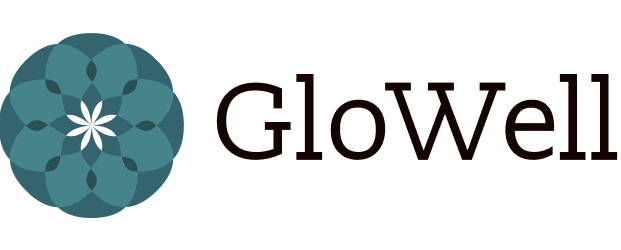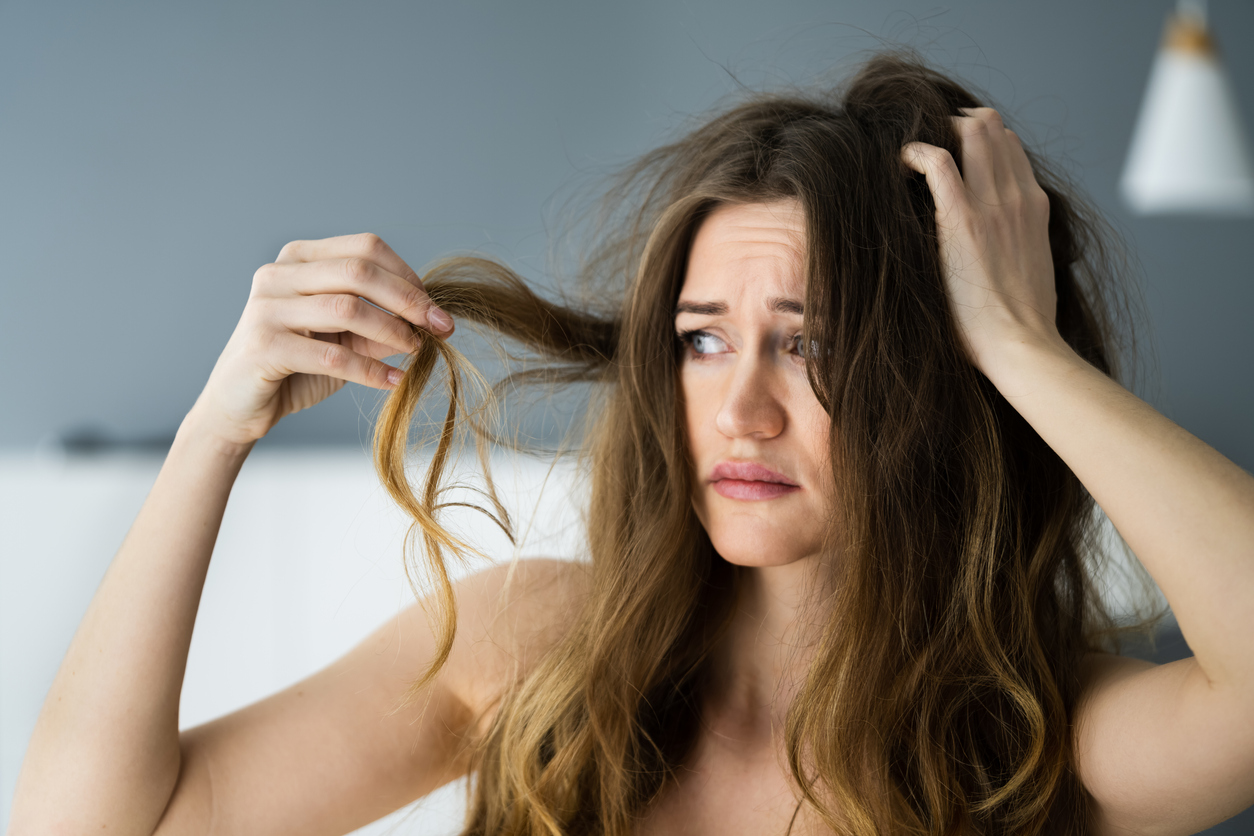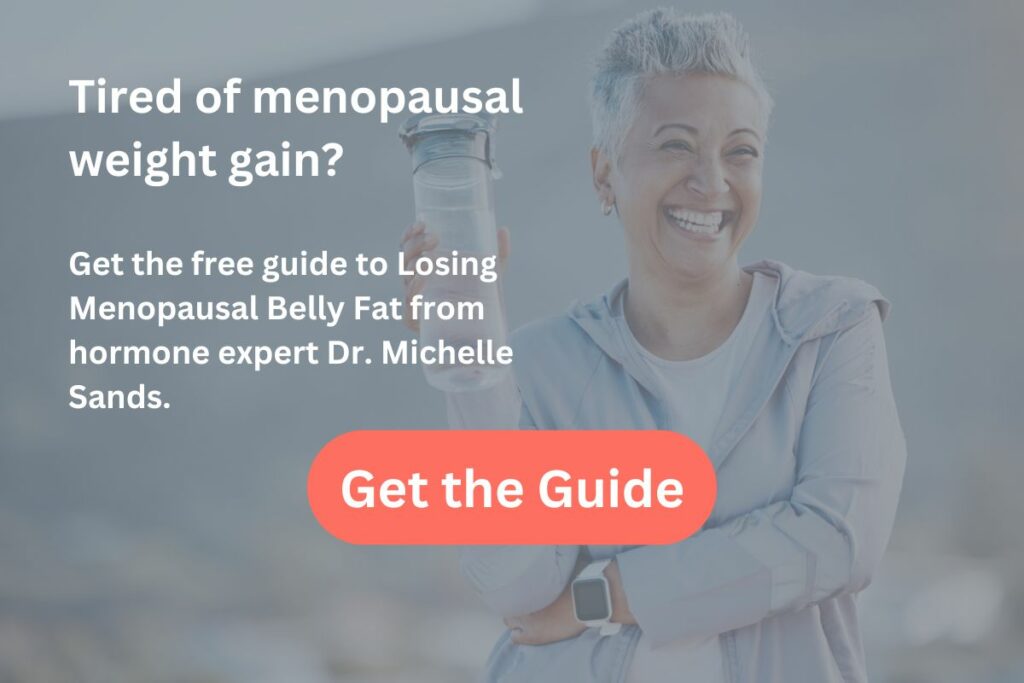You’ve noticed the signs: excessive amounts of hair accumulating in your hairbrush and more strands than ever tangled around your fingers when you shampoo. Maybe you’ve been shocked at a recent photo, staring at your scalp and wondering why no one has told you your hair loss has gotten so horribly bad.
Hair loss may be a natural occurrence, but there’s something so gut-wrenchingly difficult about seeing the signs of it. When you’re in the middle of perimenopause or menopause, it may make you wonder if this is just one more of the many hormonal changes you’re left to deal with.
Can Menopause Cause Hair Loss?
Table of Contents
Is Hair Loss a Menopause Symptom?
During menopause, your body goes through many changes as a result of fluctuating hormone levels. Hot flashes may be the most well-known menopause symptom, but it’s joined by other unpleasant symptoms such as mood swings, sleep disturbances, and changes to your skin and hair that are, let’s be honest here, completely unfair.
Menopause lowers estrogen and progesterone, two hormones that help hair grow faster and promote fullness and density. As estrogen and progesterone levels decrease during menopause, it triggers the production of androgens—male hormones that can shrink hair follicles and encourage the production of unwanted facial hair.
Did we mention how unfair this process is?
Go ahead, take a moment, and get really, really angry. Feeling sad or mad about less hair on your head —and more on your face—is okay.
What Does Menopause Hair Loss Look Like?
Hormonal hair loss looks different than genetic hair loss or hair loss in males. When you start experiencing hair loss or thinning hair from menopause, you’re likely to see it across the top of your head, not your hairline.
Menopausal hair loss looks like a gradual widening of your part, a thinner ponytail, and even a duller, less shiny appearance overall.
You’re not likely to see menopausal hair loss manifest as the U-shaped receding hairline you associate with genetic male pattern hair loss.
When Does Menopause Hair Loss Begin?
The hormonal changes that can lead to hair loss can begin in any of the three stages of menopause. You may begin to see signs of hair loss during perimenopause — the first stage of menopause that can occur up to ten years before actual menopause begins. The average age of menopause is 51 years old, so this means women may experience hormonal changes that cause hair loss anytime in their 40s.
Will Hair Loss from Menopause Grow Back?
Experiencing menopausal hair loss can feel very discouraging, but there is a bright spot to look forward to. In most cases, menopausal hair loss is not permanent.
Menopausal hair loss is a result of changing hormones, primarily excess androgens and decreased estrogen and progesterone. Androgen levels will gradually decrease as you move through menopause and post-menopause, eventually reaching even lower levels than in your 20s and 30s.
This is great for hair loss but not so great for libido and other androgen-based functions, but that’s another topic.
Estrogen levels drop off after menopause and do not naturally recover. However, there are ways to increase estrogen naturally and support hormone levels throughout menopause to help stop menopausal hair loss.
How Can I Stop Hair Loss From Menopause?
You may be able to increase estrogen naturally and stop menopausal hair loss through diet and lifestyle changes or from hormone therapy.
Hormone Therapy
Hormone therapy is used to boost levels of hormones such as estrogen and progesterone to help reduce or manage some of the symptoms of menopause. Hormone therapy can take the form of oral pills, topical creams, gels, sprays, vaginal rings or vaginal tabs.
Bioidentical Hormone Therapy
Hormone therapy comes in two forms: conventional hormone therapy (HRT) and bioidentical hormone therapy (BHRT).
Conventional hormone therapy uses synthetic hormones to replace estrogen, progesterone, and testosterone. Bioidentical hormone therapy uses plant compounds to replace these hormones. The FDA has approved some forms of BHRT.
Both conventional HRT and BHRT can bring risks, so it’s important to work with a licensed medical provider to help you determine if either of these hormone replacement therapy options are right for you.
If you’re not ready to try hormone replacement therapy, there are other natural ways you can support your hormones, starting with:

Estrogen-Boosting Foods
Food can have a powerful effect on your health, and a menopausal diet can help boost your natural ability to produce estrogen. Every bite of food you eat becomes a cellular building block inside your body. Think about food as a powerful ally in supporting your health, helping you manage menopause symptoms, and protecting against hair loss.
It’s no surprise that a diet full of sugary, processed junk will not help balance hormones or stop hair loss. So load up your plate with estrogen-promoting foods such as:
- Flax seed
- Edamame, tofu, and soybeans
- Peaches
- Berries
- Sesame seeds
- Garlic
- Broccoli
- Cabbage
- Collard Greens
Don’t Forget the Fat
Essential fatty acids play an important role in hair health as well as heart and brain health. The best sources of essential fatty acids are fish, fish oil, and flax seed. You can also get essential fatty acids from walnuts and almonds, hemp seed, and olive oil.
Getting Enough Estrogen-Supporting Vitamins and Minerals
What vitamins are good for menopause hair loss? Some vitamins and minerals can support estrogen production and help your body use it more effectively. Studies have shown that certain vitamins and minerals play a critical role in estrogen production, including:
- Boron, found in prune juice, avocados, and peaches
- B vitamins found in meat, fish, and leafy greens
- Vitamin E, found in almonds, sunflower seeds, wheat germ oil, and pine nuts
Vitamin D can also help with estrogen production. Your body naturally produces Vitamin D with sun exposure. Take a morning walk (before the sun hits full strength) and get some exposure on your arms and face to help produce more of this nutrient. Or ensure you’ve got a high-quality Vitamin D supplement for winter months without sun exposure.
Natural Supplements for Estrogen Support
Many herbs and natural supplements can also affect estrogen levels, including:
- Black cohosh: a Native American herbal remedy to treat menopause symptoms associated with low estrogen, shown in a study to be especially effective in treating hot flashes.
- DHEA (dehydroepiandrosterone): A synthetic version of this naturally occurring hormone may help support the production of testosterone and estrogen.
- Red clover: Research shows this herbal phytoestrogen (a plant that acts like estrogen in the body) effectively alleviates hot flashes in menopausal women.
Reduce Stress
Of course, you’re stressed. Your hair is falling out by the fistful. You’re probably not getting the deep, restful sleep you need, you’re sweating all of the time, and your skin is breaking out.
And those are just menopause symptoms.
You may have school-aged kids at home or even an aging parent to care for. Work is crazy. Your calendar is so full it makes you want to cry. Relationships are hard. There’s never enough time in the day for you.
But being on the hamster wheel of stress isn’t doing your hair any favors. In fact, stress may be exasperating your hair loss.
Chronic, long-term stress can be devastating for your health. Researchers have found that stress can also be equally devastating for hair loss. When researchers exposed mice to long-term stress, the mice experienced reduced hair growth. When they removed the adrenal glands that produce stress hormones—like cortisol—from mice, it led to rapid hair regrowth.
When stress hormones such as cortisol get elevated due to chronic stress, it causes your hair follicles to enter a premature “resting phase,” causing hair to fall out in large amounts.
If you want to encourage your hair to get out of the resting phase and back into the active growing phase, you’ve got to learn how to manage your stress.
Try adaptogens, deep breathing exercises, exercise, or therapy if your stress is getting out of hand.
Drink More Water
Water is crucial to every system and process in your body. After all, we’re nothing but walking houseplants, right? You know you need to drink plenty of water. But you’re probably still not getting enough.
It’s ok.
Just drink more tomorrow.
Fill up your favorite emotional-support cup and sip it throughout the day. Then refill it. Drink a cup of water before your first cup of coffee. Then drink a cup of water before your next cup of coffee.
The recommended amount of water for women is 9 cups (2 liters) daily.
Add some slices of lemon or lime if you want some extra flavor, or a sprinkle of sea salt if you’re feeling particularly dehydrated.
Move Your Beautiful Body
Did you know that exercise can help balance hormones? Moving your body brings so many benefits, and hormone support is just one of them. Exercise (cardio training and resistance training) can help boost estrogen levels and get cortisol in check.
All you need is 30 minutes a day of movement to support balanced hormones.
Yes, Menopause is Causing Hair Loss. But You Can Help It.
Your changing hormone levels are changing your hairline. But that doesn’t mean you have no options to defend against it. Balancing your hormones is key to protecting against further hair loss or even activating hair regrowth. You can do this naturally, by following an estrogen-supportive diet and getting plenty of hormone-balancing nutrients from food and supplements. Or you can get the help of a medical professional to guide you through your options for hormone replacement. Along the way, be sure to nourish yourself: body, mind, and spirit. Prioritize exercise, do everything you can to curb stress, and don’t forget to drink plenty of water.
Your hormones are changing, and so should your priorities. It’s not okay to put your health on the backburner any longer — let your hair loss remind you that your health and well-being take center stage through every phase of menopause and every phase that comes after.
Free Menopause Resources
This post may contain affiliate links, which provide a small commission to us when you purchase, at no additional cost to you. Thank you for helping to support our efforts in providing you the best, most up-to-date information for GloWell.
Menopause and hormonal expert Dr. Michelle Sands offers amazing free resources for women experiencing perimenopause and menopause symptoms. Download her FREE ebook, Hormone Harmony Over 35, and discover a 21-day plan to help balance hormones and reduce menopause symptoms. Explore her Hormone Restoration Masterclass, 7 Day Me-NO-Pause Meal Plan, and more incredible resources to help your menopause journey.












Join the GloWell Community on Social!
Don't risk missing a single thing. Follow us on social and become part of the GloWell community.